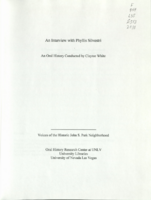Search the Special Collections and Archives Portal
Search Results

Transcript of interview with Mark Hall-Patton by Claytee White and Stefani Evans, August 25, 2016
Date
Archival Collection
Description
Mark Hall-Patton, administrator of Clark County Museums and since 2008 a frequent guest on the popular cable television show Pawn Stars, was born in 1954 in San Diego, California. His mother was a registered nurse and his father served in the United States Navy. From early childhood, Mark’s interest in history and museums shaped his path in life. After graduating high school in Santa Ana, California, he earned his Bachelor’s degree in history at nearby University of California, Irvine. Degree in hand, Mark worked for Bowers Museum in Santa Ana and founded the Anaheim Museum in 1984. He moved to Las Vegas, Nevada in 1993 to create the Howard W. Cannon Aviation Museum in McCarran International Airport. By 2008, Mark had become administrator over all Clark County museums. In this interview, he explains the various ways his involvement with the popular Pawn Stars program has turned “the museum guy” into a brand, introduced production companies to the value of filming in Las Vegas, increased Clark County museum visits and donations, and raised popular awareness of the academic fields of history and museum studies.
Text

Apolonio Sauceda interview, August 13, 2019: transcript
Date
Archival Collection
Description
Interviewed by Barbara Tabach and Monserrath Hernández. Born in 1927 to Mexican immigrant parents, Apolonio spent his youth in the Kansas City, Kansas area. Arrived in Las Vegas and was a map maker for Clark County. Very involved in local Latino community, NALA, Veterans organizations, and was an actor on the side. Subjects: NALA, American Legion, Lt. Colonel in Nevada Color Guard
Text

Maria Casas interview, June 12, 2019: transcript
Date
Archival Collection
Description
Interviewed by Maribel Estrada Calderón. Farmersville is described as a small town between, Exeter and Visalia, California populated by Mexican American farm workers. It is in this small town, where UNLV History Professor Maria Raquél Casas spent her childhood raised along with her sisters and brothers. In her interview, Dr. Casas describes how growing up in this small town with her traditional Mexican family influenced the person she is today. While working alongside her family in the fields, Dr. Casas decided that she would strive to obtain an education. Through hard work and constant support from her sister, Dr. Casas attended Fresno State, where she discovered her love for history. Upon completing her undergraduate program, Dr. Casas made the decision to further her education by pursuing a master's at Cornell University. At Cornell, she faced discouraging professors who believed she would not be able to complete the master's program let alone pursue a PhD program. Despite these demoralizing professors, Dr. Casas completed her program and was admitted into University of California Santa Barbara's history program. Dr. Casas never forgot her roots or the significance of her presence in the majority white academic spaces she attended during her academic journey. When she arrived at UNLV, she continued to strive for more Latino representation in both the student population and in the school faculty. During her tenure at UNLV, Dr. Casas has served as an advisor for multiple Latino student organizations including MEChA and SoL. Dr. Casas has witnessed much progress in Latino representation at UNLV, but she believes there is still much work left to be accomplished.
Text

Transcript of interview with Phyllis Silvestri by Claytee White, January 11, 2010
Date
Archival Collection
Description
As a young woman, Phyllis Silvestri made the adventurous decision to move to the United States. She was bom in Canada and lived there until her early 20s. Over the next few years, Phyllis and her friend Mona logged many miles, worked and visited several states. By 1953, Phyllis had met and married Vincent Silvestri, who worked at Bingo Palace, now the Sahara Hotel and Casino. Soon they had their first child and had bought a home on Santa Rosa. A few years later they were building a new home in the John S. Park area. She proudly recalls her husband's attention to details such as including lots of built-in features and a bomb shelter that represents the era. Phyllis talks fondly of the neighborhood, but also recalls her children not being allowed to play with some of the neighborhood children because they were of Italian ancestry.
Text

Transcript of interview with Julie Menard by Joyce Marshall, March 17, 1996
Date
Archival Collection
Description
Julie Menard began her career as a showgirl in 1964, performing in the Folies Bergere at the Tropicana Hotel. Although she appeared in the show for only sixteen months, she offers an insider’s view of the early Las Vegas entertainment scene. She describes a period when showgirls were treated as local royalty and “the boys” wielded considerable influence. Menard’s narrative sheds light on the glamour and complexities of the showgirl. Her descriptions of physical characteristics of the job, the day to day work schedules, the expectations of physical beauty, as well as the stigma of her occupation outside of Las Vegas offer a fuller view of the job. Menard left Las Vegas in 1966 to pursue a film career in Europe but like many Las Vegas entertainers, she returned to make the desert city her home. Although her brief performing career failed to prepare her for future employment, she relishes her brief experience as a showgirl. Her narrative evokes the glamour, excitement and mystery of Las
Text

Lillian Morrison interview, 1996: transcript
Date
Archival Collection
Description
Lillian Morrison was the first uniformed female who worked for Park Service and has worked for Reclamation for 20 years during the war at Camp Williston. Morrison recalls life in Boulder City during the late 1930s and 1940s. Morrison is the wife of Lloyd Shorty Morrison.
Text

Transcript of interview with Rowena Gonzalez by Michael Boyd, March 1, 1977
Date
Archival Collection
Description
On March 1, 1977, Michael Boyd interviewed Rowena Gonzalez (born 1946 in Wichita Falls, Texas) about her life in Nevada. Gonzalez first talks about her family background and residential history before discussing the way of life in Texas and eventually in Las Vegas. Several topics covered in the interview include Gonzalez’s recollections of the atomic testing, the building of the Hoover Dam, and Howard Hughes. The two also discuss tourism, the properties on the Strip and in Downtown Las Vegas, and early means of transportation.
Text

Transcript of interview with Bertha Gresh by James M. Green, November 1, 1974
Date
Archival Collection
Description
On November 1, 1974, collector James M. Greene, interviewed widow and mine leaser, Bertha Gresh (born August 29th, 1883, in Cedarburg, Wisconsin) in her home in Nelson, Nevada. This interview covers early mining days, Bertha’s personal history, and the history of Nelson County. She also discusses her art, social activities, and the prizes she won as a visual artist in Nevada.
Text

Transcript of interview with Sally Halko by Roberta Farmer, March 11, 1978
Date
Archival Collection
Description
On March 11, 1978, Roberta Farmer interviewed Sally Halko (born 1921 in Gowen, Oklahoma) about her life in Las Vegas, Nevada. Halko first talks about her family background, education, traveling, and church membership. She later talks about the development Las Vegas casinos, racial minorities, housing growth, Lake Mead, and the first theaters.
Text

Transcript of interview with Vivian Harwell by Pamela Atkins, February 27, 1979
Date
Description
On February 27th, 1979, Pamela Atkins interviewed Vivian Harwell in Las Vegas, Nevada. Harwell begins the interview by explaining her reasons for moving to Las Vegas from Arkansas, and the type of living quarters that she had. She then goes on to talk about the recreation in Las Vegas in addition to the Nevada Test Site and local politics. The two later discuss the convenience of having local colleges available in Las Vegas and the availability of children’s activities in Las Vegas. The interview concludes with Harwell’s personal reflection on her time living in Las Vegas, and that she does not regret moving to Las Vegas.
Text
